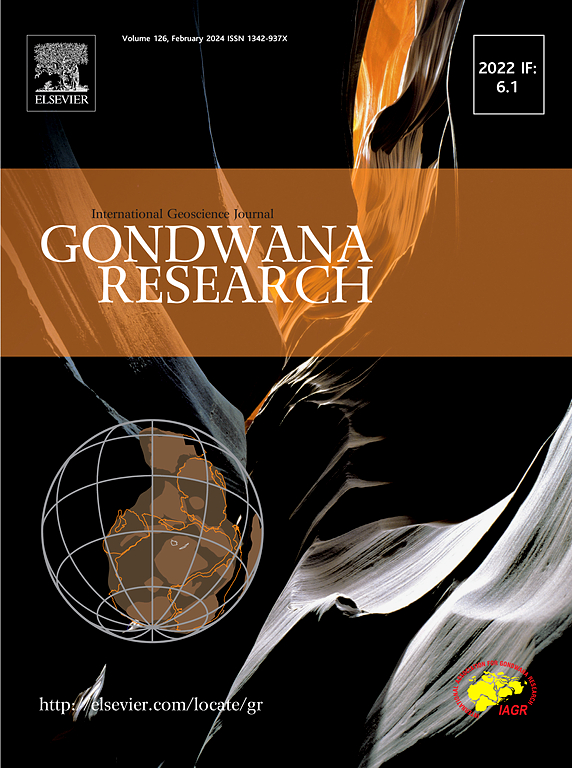Analysing the impact of oil prices, economic activity, and trade policy uncertainty on CO2 emissions in the US context: A wavelet approach
IF 7.2
1区 地球科学
Q1 GEOSCIENCES, MULTIDISCIPLINARY
引用次数: 0
Abstract
This study examines the simultaneous co-movements between oil prices, economic activity, trade policy uncertainty, and CO2 emissions in the United States using a series of wavelet methodologies. Unlike traditional approaches, the wavelet approach is appropriate for understanding the time-varying associations at different frequencies and is designed to efficiently handle the non-stationary nature of economic and environmental time series data. The empirical results highlight the potential of a leading relationship where economic activities and trade policy uncertainties drive CO2 emissions in the US during the period from January 1990 to January 2022. Contrarily, the link between oil prices and CO2 emissions is characterized by intricate dynamics, exhibiting both lagging and leading co-movements at different frequencies. Moreover, economic activities have a positive impact on CO2 emissions, while in the high quantile tails, trade policy uncertainty decreases CO2 emissions. This means economic activity is slowing down during the period of high trade policy uncertainty. Our findings highlight the necessity of specific policies that reconcile economic growth with environmental sustainability, manage the effect of oil price changes on CO2 emissions, and match trade policies with emission-minimizing goals. Based on the results, this research offers important implications for policymakers to ensure the equilibrium between economic activity and environmental management within the scope of sustainable development goals.

分析油价、经济活动和贸易政策不确定性对美国二氧化碳排放的影响:小波方法
本研究使用一系列小波方法考察了美国石油价格、经济活动、贸易政策不确定性和二氧化碳排放之间的同步协同运动。与传统方法不同,小波方法适用于理解不同频率下的时变关联,并且可以有效地处理经济和环境时间序列数据的非平稳性。实证结果强调了经济活动和贸易政策不确定性在1990年1月至2022年1月期间驱动美国二氧化碳排放的主导关系的潜力。相反,油价和二氧化碳排放之间的联系具有复杂的动态特征,在不同的频率上表现出滞后和领先的共同运动。此外,经济活动对二氧化碳排放有正向影响,而在高分位数尾部,贸易政策的不确定性降低了二氧化碳排放。这意味着在贸易政策高度不确定的时期,经济活动正在放缓。我们的研究结果强调了协调经济增长与环境可持续性的具体政策的必要性,管理石油价格变化对二氧化碳排放的影响,并将贸易政策与排放最小化目标相匹配。研究结果对政策制定者在可持续发展目标范围内确保经济活动与环境管理之间的平衡具有重要意义。
本文章由计算机程序翻译,如有差异,请以英文原文为准。
求助全文
约1分钟内获得全文
求助全文
来源期刊

Gondwana Research
地学-地球科学综合
CiteScore
12.90
自引率
6.60%
发文量
298
审稿时长
65 days
期刊介绍:
Gondwana Research (GR) is an International Journal aimed to promote high quality research publications on all topics related to solid Earth, particularly with reference to the origin and evolution of continents, continental assemblies and their resources. GR is an "all earth science" journal with no restrictions on geological time, terrane or theme and covers a wide spectrum of topics in geosciences such as geology, geomorphology, palaeontology, structure, petrology, geochemistry, stable isotopes, geochronology, economic geology, exploration geology, engineering geology, geophysics, and environmental geology among other themes, and provides an appropriate forum to integrate studies from different disciplines and different terrains. In addition to regular articles and thematic issues, the journal invites high profile state-of-the-art reviews on thrust area topics for its column, ''GR FOCUS''. Focus articles include short biographies and photographs of the authors. Short articles (within ten printed pages) for rapid publication reporting important discoveries or innovative models of global interest will be considered under the category ''GR LETTERS''.
 求助内容:
求助内容: 应助结果提醒方式:
应助结果提醒方式:


